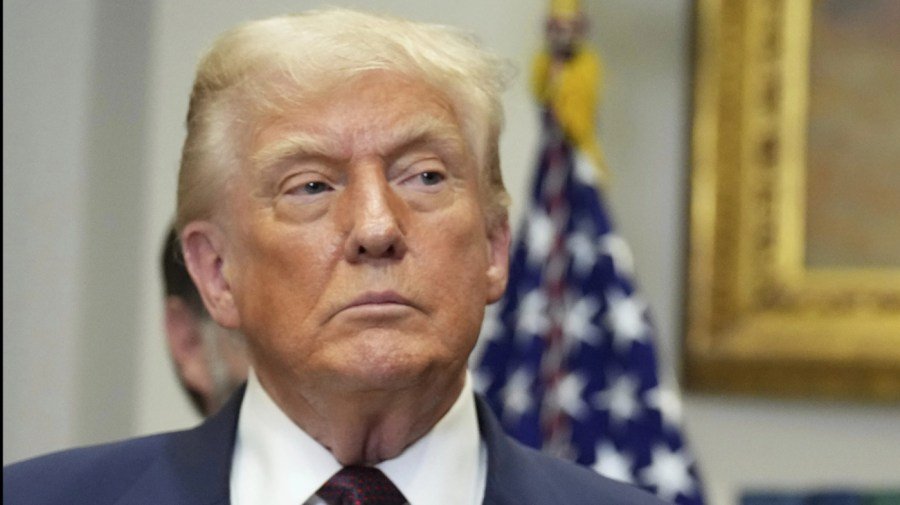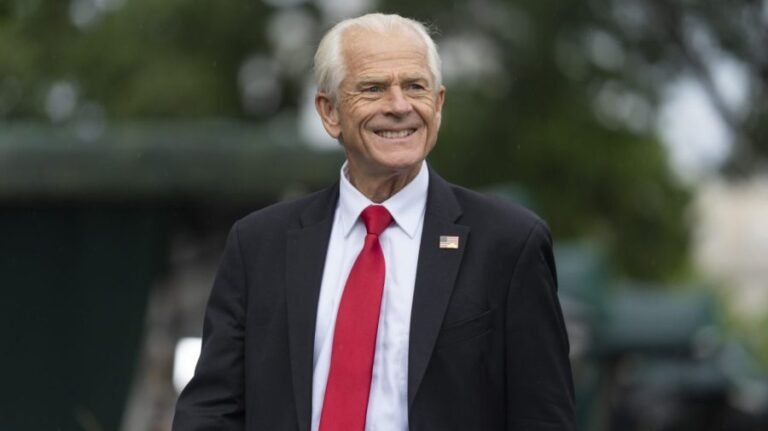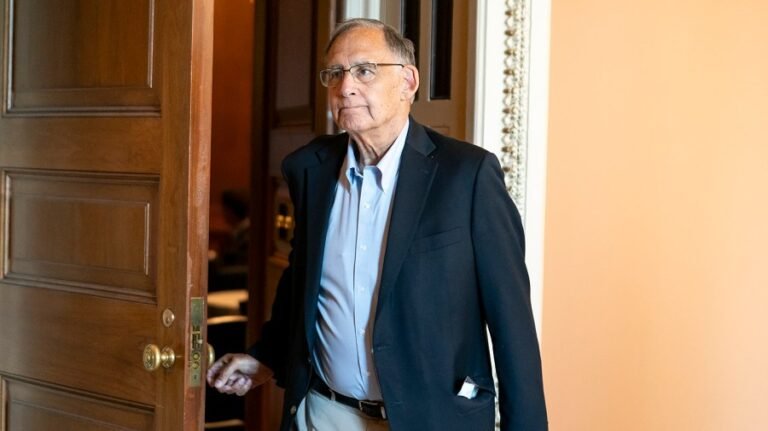
In today’s issue:
▪ Sweeping new tariffs unveiled
▪ Trump spars with GOP senators
▪ Harris steps back into spotlight
▪ Witkoff, Huckabee visit Gaza
President Trump unveiled sweeping tariffs on dozens of countries late Thursday as he presses ahead with new levies on U.S. trading partners and shifts timelines to clinch agreements.
Trump announced a new deadline of Aug. 7 for steep tariffs on more than 60 countries. The move, delivered hours before a midnight deadline for rates to kick in, gives officials more time to prepare to implement the tariffs while extending the runway for the White House to land more deals.
The new tariff rates establish a 10 percent baseline for all imports, while setting higher levies on many countries including Syria (41 percent), Laos (40 percent), Switzerland (39 percent), Iraq (35 percent), South Africa (30 percent) and India (25 percent).
It’s the latest twist in an evolving push to rebalance the global trading system, first unveiled in April and then delayed twice.
The president told NBC News in an interview Thursday night that it’s “too late” for countries to avoid the rates set to snap into place next week, while leaving the door open to future deals.
“It doesn’t mean that somebody doesn’t come along in four weeks and say we can make some kind of a deal,” he said.
While the schedule for most tariffs is extended another week, Trump carried through on his threat to hike tariffs on Canada to 35 percent.
He cited the illicit drug flow from the country into the U.S., though this week also hit Ottawa’s plan to recognize Palestinian statehood. The new rate doesn’t apply to goods covered under the 2020 United States-Mexico-Canada Agreement (USMCA).
The president also signed an executive order raising tariffs on imports from Brazil to 50 percent.
Trump said that some countries, despite having begun negotiations with the United States, have not yet met his terms to “address imbalances in our trading relationship or have failed to align sufficiently with the United States on economic and national-security matters.”
The White House has boasted of pacts made so far, including with the European Union, South Korea, Japan, the United Kingdom, Indonesia and the Philippines in recent days, but agreements with other crucial trading partners — Mexico and China — remain in the works.
The president said Thursday he would allow another 90 days for trade talks with Mexico, the United States’ largest trading partner, keeping in place a 25 percent tariff on goods not covered under the USMCA and punting a higher 30 percent tariff. The U.S. and China have been working under a separate Aug. 12 deadline for a deal.
“The complexities of a Deal with Mexico are somewhat different than other Nations because of both the problems, and assets, of the Border,” Trump wrote on Truth Social. “We will be talking to Mexico over the next 90 Days with the goal of signing a Trade Deal somewhere within the 90 Day period of time, or longer.”
The president has long said his goal for tariffs is twofold: He wants to get better deals for the U.S., and he wants to regrow America’s manufacturing industry by forcing businesses to relocate stateside.
“Fifteen percent is for today,” Peter Kim, a managing director at KB Securities in South Korea, told The New York Times. “It will take a while for Korean companies especially to say ‘OK, this is a new regime, we will start to make these long-term decisions on our manufacturing base.’ Some companies I’ve spoken to are just saying, we’re just going to weather it out, at least a few years, before we feel comfortable.”
WHO WINS: The trade deals brokered in recent months have been lauded as giving the U.S. an edge over its trading partners and evidence of Trump’s dealmaking prowess with other world leaders.
But the impact has been harder to sell to Americans. Trump’s job approval rating slipped this week to its lowest point of his second term. Polls also have suggested that his tariff push is unpopular as Americans brace for higher prices.
The Hill’s Alex Gangitano reports that, while consumer confidence is improving, anxieties persist among the general public about the ultimate impact on consumers.
“They’re not genuine trade agreements of the traditional sort, which are voluntary in nature — countries negotiate, agree, sign, and then ratify,” said Douglas Holtz-Eakin, president of the center-right American Action Forum. “These are handshake agreements at the point of a gun, and I don’t see that as a particularly durable way to think about trade policy. So, we’ll see how that plays out.”
WHO PAYS: Duties are levied when products come into the U.S. from other countries, and it’s up to businesses to decide whether to absorb the additional costs or pass them to consumers. Many companies have tepidly approached the administration’s fluctuating policies and shifting rates — shouldering the burden or gradually increasing prices until more certainty is established.
Trump, for his part, has described the tariffs as being paid by foreign countries. But he also has urged companies to “EAT THE TARIFFS.”
The Wall Street Journal detailed specific examples of how companies have been handling increased rates so far.
▪ The Associated Press: A key US inflation gauge rose last month as Trump’s tariffs lifted goods prices.
▪ The Wall Street Journal: Apple’s iPhone sales blew past estimates as customers raced to beat tariffs.
▪ The New York Times: Murky pledges of investment cast shadow on Trump’s trade deals.
▪ The Washington Post: GOP senators reject Trump’s pitch to use tariff revenue for “rebates.”
COURTS WEIGH IN: An appeals court on Thursday scrutinized the White House’s assertion that emergency powers justify the new worldwide tariff hikes.
The U.S. Court of Appeals for the Federal Circuit didn’t rule in the case brought by 12 Democratic-led states and five small businesses but the panel expressed skepticism about the administration’s argument that the president has the sweeping authority under the International Emergency Economic Powers Act (IEEPA), a 1977 law that allows the president to levy emergency economic sanctions when the country faces an “unusual and extraordinary threat.”
“It’s just hard for me to see that Congress intended to give the president in IEEPA the wholesale authority to throw out the tariff schedule that Congress has adopted after years of careful work and revise every one of these tariff rates,” Judge Timothy Dyk said. “It’s really kind of asking for an extraordinary change to the whole approach.”
Smart Take with Blake Burman
SpaceX’s Falcon 9 is set to take off from NASA’s Kennedy Space Center today, after scrapping a launch yesterday due to weather. If the launch happens, it will mark the 11th mission between NASA and SpaceX since 2020, and the first of its kind since SpaceX helped rescue astronauts stranded on the International Space Station.
The launch will also be the first SpaceX trip carrying astronauts to the ISS since President Trump and Elon Musk had their falling-out and the president threatened the federal contracts of Musk’s companies, including SpaceX. This planned launch serves as a reminder that for all the talk about the Trump-Musk relationship, the government still needs to lean on one of Musk’s top companies.
Burman hosts “The Hill” weeknights, 6p/5c on NewsNation.
3 Things to Know Today
- The Smithsonian’s National Museum of American History removed referencesto Trump’s two impeachments from an exhibit. The move came as part of a White House-pressured “content review.”
- Trump’s crackdown on law firms is undermining defenses for the vulnerable.Legal aid groups say they now have fewer resources.
- The federal government is paying more than 154,000 people not to work.Early resignation offers have reduced the workforce, but critics say the moves are also wasting money.
Leading the Day
INTRAPARTY TENSIONS: Trump is increasingly directing his ire at Senate Republicans — including key allies — as he attempts to jam through many of his legislative and personnel priorities.
Sens. Josh Hawley (R-Mo.) and Chuck Grassley (R-Iowa) both ran afoul of Trump this week over a stock trading ban and upholding the “blue slip” process, respectively, The Hill’s Al Weaver reports.
While Trump has long had a tendency of airing his grievances out in public — especially toward those he views as disloyal — the latest barbs at staunch backers are raising eyebrows, and drawing questions about whether the strategy will continue to be effective in advancing his agenda.
Trump has repeatedly tangled with Sen. Rand Paul (Ky.), a libertarian-minded Republican who is not shy about voting against the president’s priorities, as well as Sen. Mitch McConnell (Ky.), the former Senate GOP leader who spoke out against Trump, voted against several of his nominees and became a leading voice in favor of Ukraine aid.
“I don’t think it’s helpful for the president … to get in a tit for tat with other Republican members,” said Sen. Shelley Moore Capito (W.Va.), a member of GOP leadership. “He needs every single one of us, and we need him.”
▪The Hill: Hawley said he had a “good chat” with Trump after the president railed against him for supporting a bill that would prohibit lawmakers, future presidents and vice presidents from trading stocks.
MEANWHILE: Senate Democrats are facing their own intraparty tangles over how far to go opposing Trump’s agenda. The dispute spilled out into the open Tuesday afternoon when Sen. Cory Booker (N.J.) slammed his fellow Democratic senators, accusing them of “willing to be complicit” with Trump and wanting to “look the other way” as he targets some blue states.
Polls show the Democratic Party with a low job approval rating — between 33 percent and 40 percent, according to recent surveys — and some Democrats think part of the problem is that their base doesn’t think they’re fighting hard enough against Trump’s agenda. The Hill’s Alexander Bolton writes some Democratic senators privately agree they need to put up more of a fight when Trump runs roughshod over Congress and Democratic priorities.
“There is a deep, deep interest among folks for us to try to find some way to better dramatize the authoritarian takeover,” said a Democratic senator, who requested anonymity to discuss internal discussions. “I hear this all the time from folks back home.”
▪The Hill: Longtime Rep. Danny Davis (D-Ill.) announced Thursday that he will retire from Congress at the end of this term, ending a three-decade run representing parts of Chicago on Capitol Hill.
Where and When
- The president will receive his intelligence briefing at 11 a.m. At 4 p.m., he will depart the White House for Bedminster, N.J.
- The Senate will convene at 10 a.m.
- The House is in recess until next month.
Zoom In
BACK IN THE SPOTLIGHT: Former Vice President Kamala Harris made her first postelection interview appearance Thursday on CBS’s “The Late Show with Stephen Colbert,” brushing off speculation about running for president a third time while touting her new book.
Colbert asked Harris if the reason she declined to run for governor of California is because she is going to run for a different office.
“No,” Harris said. “I don’t want to go back in the system. I think it’s broken.”
“I always believed that as fragile as our democracy is our systems would be strong enough to defend our most fundamental principles, and I think right now that they’re not as strong as they need to be,” she added. “I want to travel the country, I want to listen to people, I want to talk with people and I don’t want it to be transactional where I’m asking for their vote.”
The appearance on Colbert’s show was strategic. It followed CBS canceling Colbert’s show, as well as parent company Paramount Global’s $16 million settlement with Trump after a defamation lawsuit stemming from a “60 Minutes” interview with Harris, then the Democratic nominee.
Harris’s decision not to run for California governor next year opens the door for her to enter what is already expected to be a crowded 2028 Democratic field. Political observers say Harris would hold an early lead because of her widespread name recognition, writes The Hill’s Amie Parnes, but they caution Democrats not to get too attached.
“It’s in the Democrats’ best interest … to make sure that no one appears to be elevated to the role of Democratic nominee,” said Democratic strategist Basil Smikle. “People want to see a process and a debate about the future of the party. Make it robust. Make it passionate. And somebody will emerge. Primaries can be very healthy for being able to sharpen the message and the messenger.”
The former vice president is set to release a memoir in September detailing her truncated 2024 presidential campaign. The book, titled “107 Days,” will offer insights into her losing campaign against Trump.
▪Politico: Former Rep. Katie Porter (D-Calif.) gets the edge in California as Harris passes on the governor’s race.
2028 WATCH: Former Transportation Secretary Pete Buttigieg has been quietly making the rounds on an early 2028 tour. He’s writing a book, and he’s skipping out on runs for Senate and governor.
“Right now, you’ve got an administration that is burning down so many of the most important institutions that we have in this country, which is wrong,” Buttigieg said recently on NPR. “It is also wrong to imagine that we should have just kept everything going along the way it was. And I think that my party needs to do a better job of addressing the fundamental problems that have led people to mistrust everything.”
While all signs point to “yes” on another Buttigieg presidential run, some Democrats wonder if he has what it takes to win. An Emerson College poll in late June showed Buttigieg continues to face problems with Black voters. In a stunning result, zero percent of Black respondents supported him when asked whom they’d back for the Democratic Party’s presidential nomination in 2028.
“He’s got one big, glaring soft spot … which is his relationship with the Black community,” one veteran Democratic strategist told The Hill’s Parnes. “He didn’t have a lot of African American fans from his time as mayor, he didn’t have a lot of Black support when he ran for president, and I haven’t seen evidence that he’s done much to fix that over the last few years.”
“HE’S JUST STARTING”: In his second post-office visit in Chicago, former President Biden accepted an award from the National Bar Association as he blasted Trump without ever saying his name. Biden warned his successor was “dismantling the Constitution.”
“Judges matter, courts matter, the law matters, and the Constitution matters,” Biden said. “I think a lot of Americans are starting to realize that under this president. … Get ready folks, he’s just starting.”
▪ABC News: Mike Donilon, Biden’s senior adviser, appeared for a closed-door interview on Thursday in the House Oversight and Government Reform Committee’s probe into the former president’s mental fitness while in office.
▪The Hill: Rep. Jerry Nadler’s (D-N.Y.) Generation Z primary challenger Liam Elkind’s campaign said Thursday it pulled in more than $340,000 in fundraising in its first day.
MISSED VOTES: Sen. Elissa Slotkin (D-Mich.) missed multiple votes Wednesday, including two on arms sales to Israel, while she was in New York to tape an appearance on Colbert’s show. The Democrat missed votes on two efforts by Sen. Bernie Sanders (I-Vt.) to disapprove of the Trump administration’s proposed foreign military sales to Israel at a time when the issue is being hotly debated within the Democratic Party.
Senators voted 27-70, defeating Sanders’s resolution. A second resolution garnered 24 in favor, and 73 against.
In a Thursday statement, Slotkin said had she made it back in time for Wednesday’s vote, she would have voted yes to block offensive weapons to Israel “based on my concerns over lack of food and medicine getting to civilians of Gaza.”
NEW BUILD: Construction is set to begin in September on a new ballroom at the White House, press secretary Karoline Leavitt announced Thursday. The $200 million ballroom, set to seat 650 people, will be built adjacent to the White House where the East Wing sits. Leavitt said the East Wing will be “modernized,” with offices in that area relocated during construction.
“I’m doing a lot of improvements,” Trump told NBC News of his renovations to the White House. “I’ll be building a beautiful ballroom. They wanted it for many, many years.”
▪The Hill: Around the country, student loan borrowers are struggling with what to do and overwhelmed with confusion as repayment plans are set to dwindle and interest accrual for the millions on the SAVE plan will restart today.
Elsewhere
ISRAEL AND GAZA: White House special envoy Steve Witkoff and U.S. Ambassador to Israel Mike Huckabee are in Gaza today with Israeli Prime Minister Benjamin Netanyahu, visiting an aid distribution center as Israel faces sharp international criticism for the humanitarian crisis in the besieged enclave.
Trump is expected to approve a new Gaza aid plan after Witkoff’s visit. The president said on Thursday that the humanitarian crisis in Gaza would end if Hamas releases the hostages and surrenders.
In Gaza, the “window to prevent mass death is rapidly closing, and for many it’s already too late,” Kiryn Lanning, senior director of emergencies of the International Rescue Committee, a U.S.-based humanitarian organization, told NBC News. The World Health Organization warned that the “health and well-being of an entire future generation” is at stake.
Trump in recent days has publicly and repeatedly broken with Netanyahu, dismissing his attempts to downplay the humanitarian crisis in Gaza, which has drawn international condemnation.
The Atlantic reports Trump has begun to believe a widely held opinion in Washington: that Netanyahu is looking to prolong the conflict in open defiance of Trump’s calls for a ceasefire. Meanwhile, some of Israel’s most important Western allies, under political pressure from voters, are now saying they will recognize a Palestinian state.
Scholars are debating whether Israel’s actions in Gaza constitute a genocide, while the global views of Israel plummet.
“The usual Israeli view is that this crisis is another temporary problem,” Natan Sachs, an analyst of Israeli politics, told The New York Times. “But that’s a misreading of the world, because it’s accelerating a global turn against Israel that has dramatic effects, especially among young people.”
Progressive push for Palestinian state: Rep. Ro Khanna (D-Calif.) and fellow progressive lawmakers are leading a push to press Trump and Secretary of State Marco Rubio to recognize the Palestinian state ahead of September’s U.N. meeting. The move would follow a number of Western countries, including France, the U.K. and Canada.
“Recognizing a Palestinian state is an idea whose time has come,” Khanna wrote on the social platform X. “The response of my colleagues has been overwhelming. We will build support and release prior to the UN convening.”
▪ The Guardian: Israel controls the flow of food into Gaza. It has calculated how many calories Palestinians need to stay alive. Its data shows only a fraction has been allowed in.
▪ The New York Times: Democratic votes in the Senate made clear that the longtime bipartisan consensus in support of Israel is, at least for the moment, in tatters.
▪ Reuters: The United States imposed sanctions on Palestinian Authority officials and members of the Palestine Liberation Organization on Thursday, saying the groups are undermining peace efforts.
UKRAINE: Trump wants a deal to end Russia’s war in Ukraine by Aug. 8, the U.S. told the United Nations Security Council on Thursday.
“Both Russia and Ukraine must negotiate a ceasefire and durable peace. It is time to make a deal. President Trump has made clear this must be done by August 8. The United States is prepared to implement additional measures to secure peace,” said senior U.S. diplomat John Kelley.
More aid: Sens. Jeanne Shaheen (D-N.H.) and Lisa Murkowski (R-Alaska) introduced legislation Thursday calling for tens of billions of dollars in aid for Ukraine to be spent over the next two years, as Russian President Vladimir Putin rebuffs calls from Trump to halt the war. The top-line figure for the bill comes in at more than $50 billion, according to Shaheen’s office.
▪The Wall Street Journal: Inside Ukraine’s effort to fortify hundreds of miles of defensive lines. Kyiv must install hundreds of lines of defense fast enough to outpace Russia’s advance.
▪The New York Times: Following backlash, Ukraine’s Parliament voted on Thursday on legislation to restore the powers of the country’s anti-corruption agencies.
Opinion
- The Crucial Issue of the 21st Century, by New York Times opinion columnist David Brooks.
- I’m a father in Gaza. My children wake in the middle of the night crying for food, writes Mohamed Hammoudeh, a nutritionist living in Gaza City, via USA Today.
The Closer
And finally … 👏👏👏 Kudos to this week’s Morning Report Quiz winners! They puzzled through presidential golf trivia for a hole-in-one.
Here’s who went 4/4: Richard E. Baznik, Stan Wasser, Harry Strulovici, Chuck Schoenenberger, Lynn Gardner, Alan Johnson, Lou Tisler, Phil Kirstein, Pam Manges, Jenessa Wagner, Laura Rettaliata, Stanton Kirk, William Moore, Dennis Barksdale, Steve James, Brian Hogan, Mark R. Williamson, Carmine Petracca, John Trombetti, Linda L. Field and Savannah Petracca.
They knew that Woodrow Wilson, who managed 1,200 rounds in six years in the White House, holds the presidential record for most rounds of golf played.
According to a Washington Post estimate, Trump played approximately 261 rounds of golf during his first term as president.
Gerald Ford gained infamy for hitting a 17-year-old spectator in the head with a golf ball.
Neither Jimmy Carter, nor Harry Truman or Herbert Hoover played golf while in the White House. The answer we were looking for was all of the above.
Thanks for reading! Check out more newsletters from The Hill here. See you next time.


